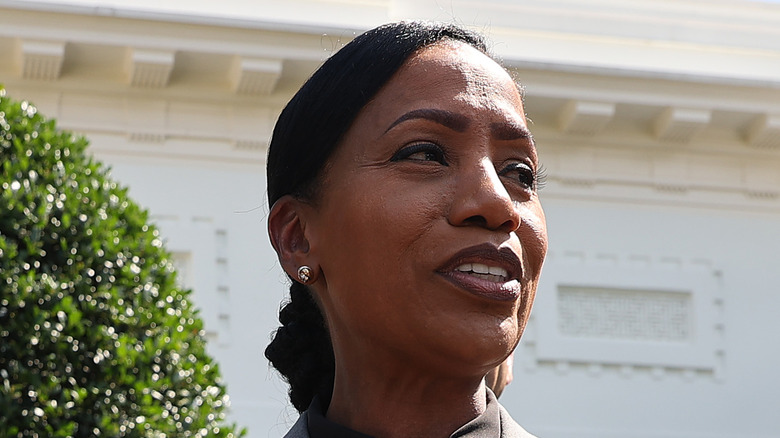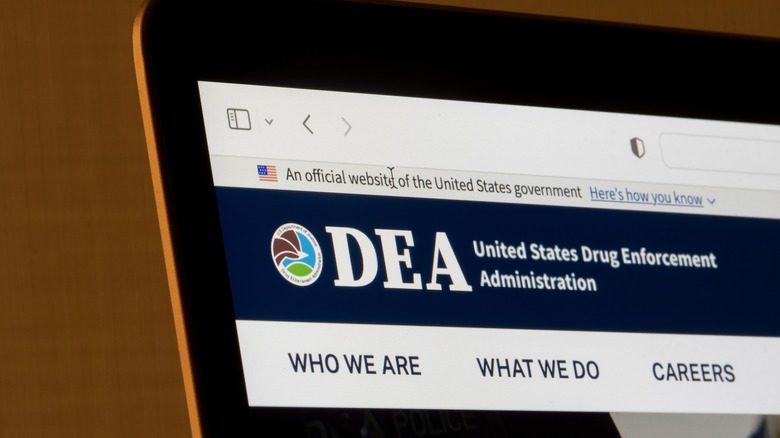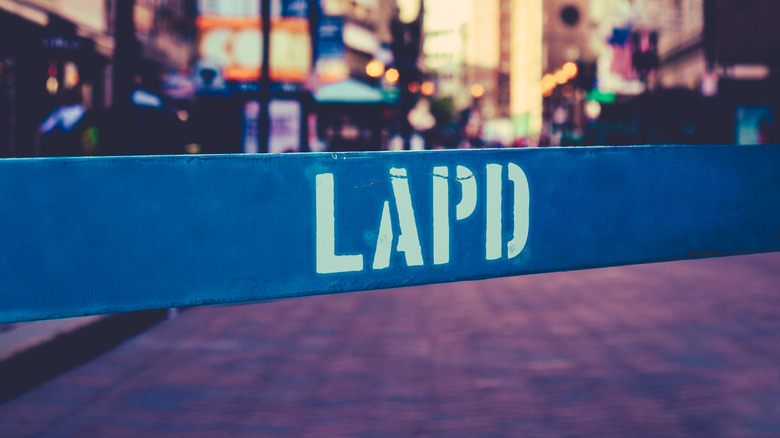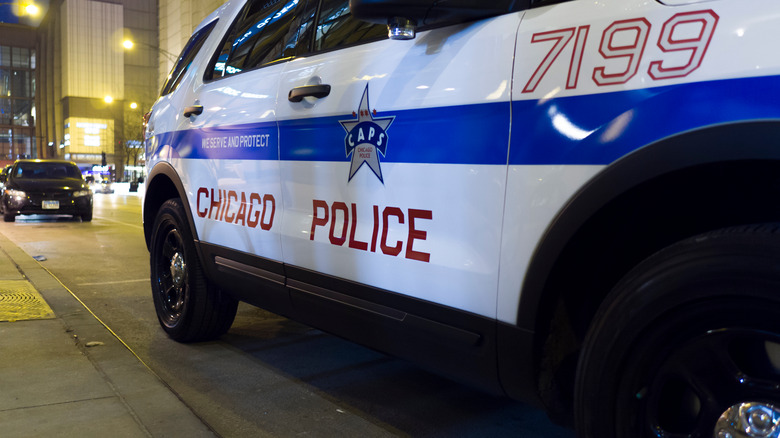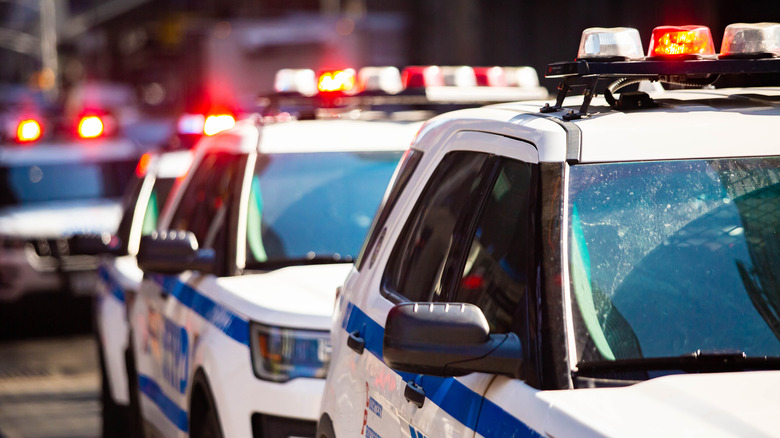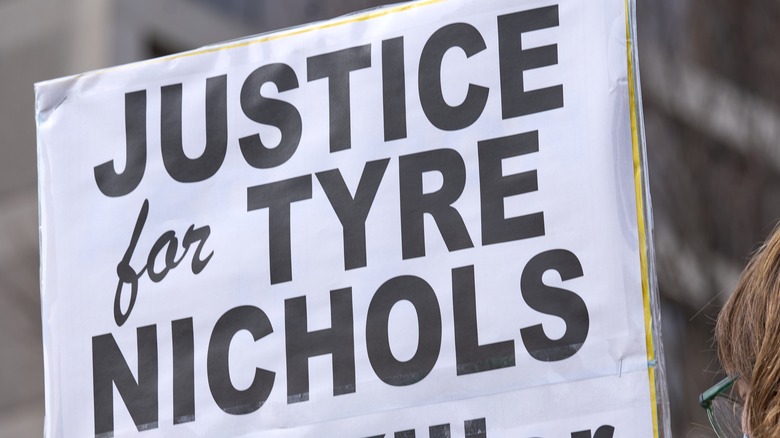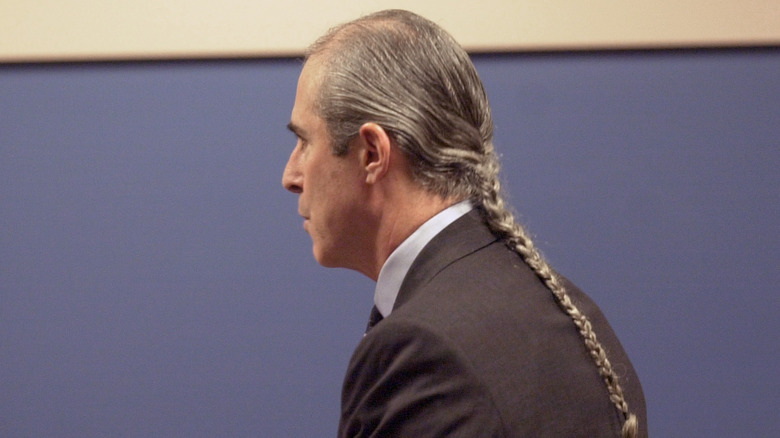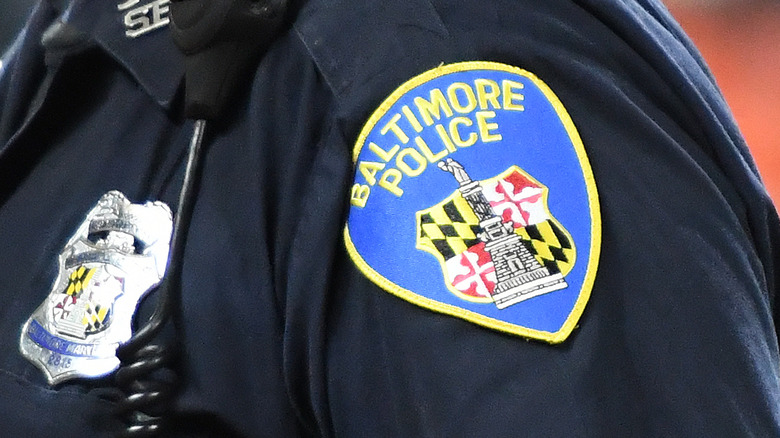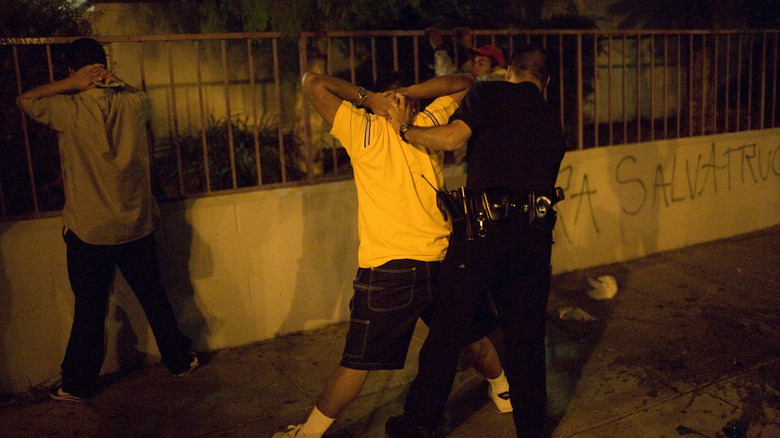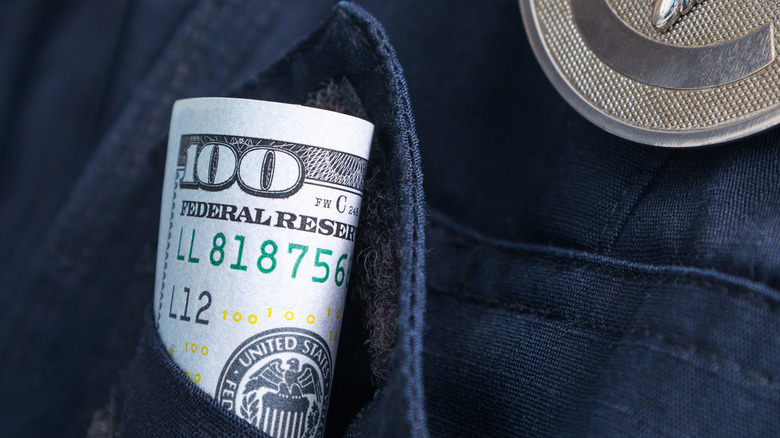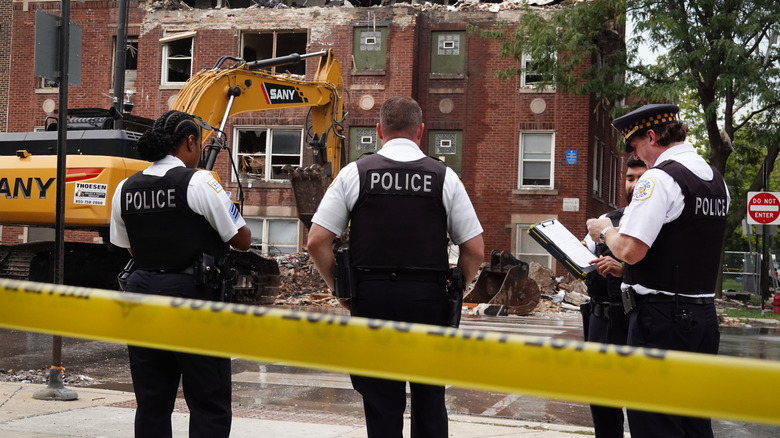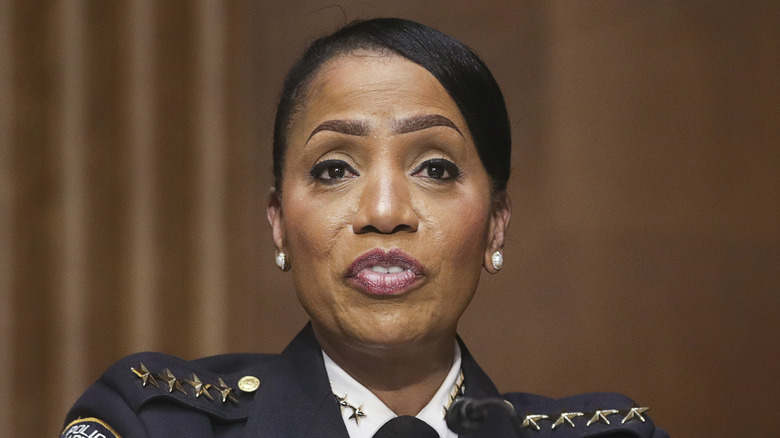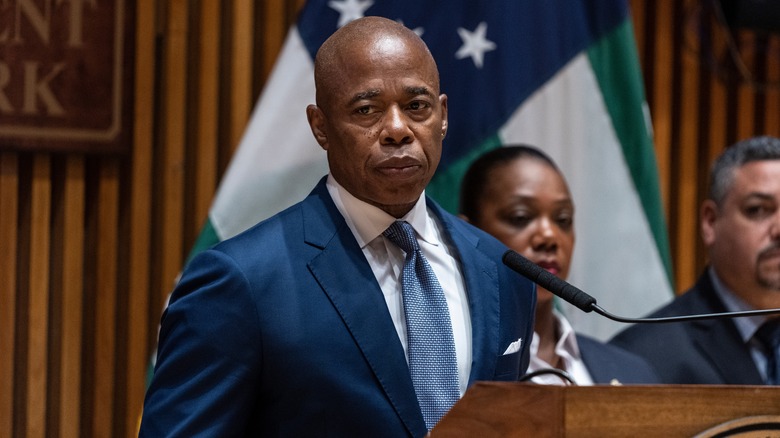What Are Specialized Police Units And How Do They Become Dangerous?
In January 2023, the horrendous killing of Tyre Nichols captured through body-cam footage and security cameras became another brutal example of law enforcement personnel behaving like judge, jury, and executioners, rather than police officers. The awful incident not only stresses the need for reform to prevent such tragedies from ever happening again, but it has also brought back into the spotlight a controversial part of many police departments in major cities: specialized police units.
As reported by The New York Times, officers involved in the killing of Nichols were part of a Memphis police unit called the Street Crimes Operation to Restore Peace in our Neighborhoods (SCORPION), launched in 2021 by Memphis Police Chief Cerelyn Davis (pictured). Before its disbandment immediately following Nichols' fatal beating, the group was comprised of cops considered elite within the department, as has been the case with many specialized units throughout the U.S. However, as revealed below, there have been too many times when some officers in these groups have proven to be the antithesis of "elite" police.
The rise of elite units as a solution to drug-related crimes
Beginning as early as the 1970s, major metropolitan areas of the U.S. were dealing with two very serious problems: the influx of an unprecedented amount of drugs accompanied by the rising occurrence of violent crimes and murders. On the federal level, the strategy to combat this was the creation of the Drug Enforcement Administration, or DEA, by President Richard Nixon in 1973, according to History. Initially, the new division operated nationwide with 1,470 agents, but over time their number has increased to 5,000.
By the 1980s, law enforcement officials in major cities determined that the DEA and their own, local agencies were simply not doing enough to stop the damage. The Miami drug war was in full swing, and in Atlanta and other cities, drugs were sold openly in some areas and drive-by shootings had become far too common, reports The Atlanta Journal-Constitution.
In many cases, the response was to establish elite units within municipal police departments with the goal of recruiting some of the most high-performing officers on the force. When talking with PBS, former Los Angeles Police Chief Daryl Gates explained, "You try to select the very best — individuals who are not afraid — people who are willing to work, people who are willing to get out and mix with the gangs, and get a better understanding of the gangs, who are not intimidated by the gangsta..."
The purpose of specialized police units
Once ideal candidates are selected for elite police units, the officers are then tasked with solving specific problems using specialized tactics. Even though drug violations and violent crimes are often the focus of specialized units, each one across the country is different in its approach.
In Los Angeles, the Community Resources Against Street Hoodlums, or CRASH unit, was formed to infiltrate gangs and put an end to their criminal activity, according to PBS. On the other hand, the more recent Community Safety Team, or CST unit, in Chicago has the stated purpose to "improve relationships and build trust in the community" (via CBS News). Yet, no matter where these elite units are located, the goal has been to deter criminals from acting just by their presence on the streets. Former Police Chief Eldrin Bell told The Atlanta Journal-Constitution, "As a result of how we policed Atlanta, what I'm hearing from people, even now, is that we struck fear in the hearts of criminals."
Examples of specialized police units in the U.S.
The SCORPION unit in Memphis and the LA-based CRASH were just two of many specialized police groups created in cities across the country over the last four decades. In Baltimore, the Gun Trace Task Force (GTTF) was active for 10 years beginning in 2007 (per Newsweek). Chicago's CST unit was preceded by the Special Operations Section (SOS) from the previous decade (per CBS News). The Red Dog unit in Atlanta, whose name was an acronym for Run Every Drug Dealer Out of Georgia, was active for several decades after it was formed in the 1980s (per The Atlanta Journal-Constitution).
While the units that specialize in drug and violent crime prevention receive the most media attention, municipal police departments also have groups that garner much less publicity yet have played an important role nonetheless. In Seattle, for instance, a specialized DUI unit operated for many years after it was formed in 1970, according to KING 5.
The methods of specialized units can be extreme
While many acknowledge that officers in specialized units are in a dangerous position since confronting violent offenders is a core part of the job, that fact does not excuse the use of excessive force. However, members of specialized police units have been associated with widespread reports of inappropriate behavior for many years. When describing the violent approach of the specialized plainclothes unit in New York City with NPR, managing director Jenn Borchetta of the nonprofit legal group Bronx Defenders said, "They would throw people against walls. I mean, we have one client who is 13 years old who was thrown against the hood of a car. Just for crossing the street."
Terrible in other ways were the actions of officers from the LAPD CRASH unit who did whatever they wanted with the gang members they interacted with. In an interview with PBS, Ruben Rojas from the Temple Street gang revealed one of their disturbing practices and said, "They would drive up into a neighborhood and snatch one of the guys that know how to fight real well. And they'll take them to another neighborhood just to see them fight."
Elite units have been involved in police killings
The fatal beating of Tyre Nichols is a horrific tragedy, though it is an incredibly sad fact that his death is not the only time when officers of specialized units have been involved in the controversial killing of a civilian. Back in 1999, members of a so-called elite plainclothes unit of the NYPD stopped Guinean immigrant Amadou Diallo because they mistook him for a suspected rapist. When the unarmed man made the mistake of reaching for his wallet, the police shot a total of 41 bullets in his direction, 19 of which hit their target and ended his life, reports NPR.
In Chicago, there was major controversy once it was discovered that James Hunt was a member of the Community Safety Team. Since the officer not only shot a 17-year-old to death in the line of duty, but then later boasted about the terrible act in a 2018 video, his assignment to the specialized unit meant to form stronger bonds with the community was heavily criticized. As reported by CBS News, the CPD moved Hunt to another unit almost immediately after the issue was investigated by a local news team, but it reflected badly on the department that such a grave error had been made in the first place.
Too much freedom and power leads to corruption
Whether it was the GTTF unit in Baltimore or the Chicago-based SOS, several of the specialized police units in cities across the U.S. all had one thing in common: Each group was allowed to carry out their critical work nearly autonomously, with very little oversight from their commanders. And due to their increased freedom, officers often took advantage of their powerful position while committing serious crimes in the process. After several officers in SOS were arrested and the unit was shut down, their exceptional independence within the department was cited as the reason why they were lured into breaking the law, according to NPR.
Similarly, when the CRASH unit in Los Angeles was accused of operating like a police gang, street gang member Ruben Rojas was not surprised because he had witnessed the behavior himself. He told PBS, "You just don't put cops in neighborhoods like that, because there is a lot of temptation, and the temptation will get you. You will bite into it — especially in West LA."
Even in the case of Atlanta's Red Dog unit, which was never the subject of a major investigation, there were still reports of the abuse of power, even if none of its officers were charged with crimes. When talking with The Atlanta Journal-Constitution, defense lawyer Bruce Harvey (pictured) said, "They were traditionally a unit that did what it wanted to do and found a way to justify it afterward."
Rampant corruption creates distrust and more crime
For the specialized units whose members were later found to be corrupt, the extent to which officers in each group had broken the law varied. However, even in the less severe cases, crooked cops still caused considerable damage within a community. As pointed out by Vox, people living in minority neighborhoods already distrust local law enforcement, given the many years of abuse they have endured. So, when word spreads about the unethical behavior of a specialized unit patrolling the community's streets, there is even less of a chance that people will contact police when trouble arises.
The weak link between the community and local officers then creates a snowball effect, to the detriment of everyone involved. Policing is not only more difficult when officers face opposition or suspicion from nearly every corner, but criminals also feel much more confident to act without fear of repercussions when unlawful activity is reported less often to the authorities.
There are units that operated like criminal gangs
In the worst case scenarios, specialized police units exploit their extraordinary power and independence to transform into gangs indistinguishable from the criminals they are supposed to confront, except for the fact that they wear badges. In Los Angeles, Temple Street gang member Ruben Rojas frequently witnessed unlawful behavior from the CRASH team and sometimes found it hard to believe how much they managed to get away with. When talking with PBS, he said, "I would tell my mom a lot. 'Mom, you know what? You're a taxpayer, you put money in those cops' pockets. You feed their families. But do you know that they're committing more crimes than what I have done?' It was an everyday thing."
Among the elite police groups that became the exact opposite of their intended purpose, one of the most notorious was the GTTF in Baltimore. The U.S. Attorney for Maryland at the time, Rod Rosenstein, could not have said it better when he stated in the indictment, "This is not about aggressive policing, it is about a criminal conspiracy. These are really simply robberies by people wearing police uniforms" (via Vox). Not only were the specialized officers found guilty of stealing at least $300,000 in cash along with drugs and jewelry worth hundreds of thousands more, but they also committed more heinous offenses such as carrying a supply of fake guns to plant near unarmed individuals in case they needed to justify shooting them to death. Not as serious but still unethical, the crooked cops constantly claimed overtime for hours not worked as well.
The fate of convicted officers
Fortunately, over the last decade, specialized units that engaged in unlawful activity have increasingly faced justice for their crimes. In Baltimore, eight officers of the GTTF unit were convicted of extortion, racketeering, robbery, and overtime fraud, which resulted in sentences that, when combined, added up to a total of 112 years, as reported by NBC News.
To Ray Kelly of the No Boundaries Coalition advocacy group, such an outcome was a long time coming. He told The Washington Post, "The only thing that is surprising to me with these trials are the actual guilty pleas and that officers are going to prison. For years we have talked about and tried to identify the levels of corruption within the BPD, and now our concerns are, sadly, being validated."
After a federal investigation, several members of the SOS unit in Chicago also pled guilty to crimes such as illegally searching both suspects and innocent victims alike, often to steal money or drugs from them. Most of the officers faced relatively minor sentences, including a few years of probation or incarceration of up to a year and a $100,000 fine, says CBS News. On the other hand, the leader of the group, Jerome Finnigan, was given much harsher punishment. In 2011, the commanding officer pled guilty to attempting to arrange a hit on someone he suspected was informing on the SOS to federal investigators. He received a 12-year prison sentence (per CBS News).
Some officers involved in scandals remained on the force
Even though controversies and scandals have put an end to several specialized units over the years, many of the officers involved in those teams not only spent no time behind bars, but got to keep their jobs as well. When Eric Olsen pled guilty to carrying out searches illegally as part of the federal case against Chicago's SOS, he was simply put on call-back status within the department, according to CBS News.
In a more complicated situation, Thomas Sherry was another one of the former members of the SOS who was charged with wrongdoing before the unit was disbanded. However, he later became one of two officers who had their charges dropped in 2009 and was given a desk position within the department for the following decade. Then in 2018, after years of what he felt was unfair treatment, Sherry filed a lawsuit but did not get the results he wanted. First off, the case was thrown out by a federal judge, but even worse was that Sherry was fired by the CPD for his alleged misconduct over a decade earlier while still in the SOS. The officer was convinced the action against him was taken to cover up the corruption and told WGN, "I think it was done out of malice. I think it was done out of spite because I wouldn't sit quietly and go off into the night."
Many specialized units have been disbanded
In January 2023, the SCORPION unit in Memphis joined the growing list of specialized police groups that no longer exist. Memphis Police Chief Cerelyn Davis (pictured) released a statement along with the announcement that said, "The officers currently assigned to the unit agree unreservedly with this next step. While the heinous actions of a few casts a cloud of dishonor on the title SCORPION, it is imperative that we, the Memphis Police Department, take proactive steps in the healing process for all impacted" (via USA Today).
Along with the specialized unit out of Memphis, the Chicago Police Department got rid of their corrupt SOS unit in 2007 (per NPR). The Atlanta-based Red Dog was disbanded in 2011, even though it was not surrounded by the same level of controversy (per The Atlanta Journal-Constitution). The shutting down of the Baltimore's GTTF unit in 2017 was one of the most publicized cases in recent years, especially after the release of the HBO series "We Own This City," about the particularly controversial officers involved (via Newsweek).
There are people who still see these units as the solution
Despite the scandalous corruption that has clouded over specialized police units, some government employees and members of the public remain convinced that they are the solution to high levels of crime in metropolitan areas. Former LAPD chief Daryl Gates is one who considered the elite officers' work a success in his jurisdiction. He told PBS, "I think we were bringing gang killings down substantially from what they were in the 1970s, and into the 1980s."
Especially in a city like Atlanta, where the specialized unit was not under investigation, there are those who insisted that getting rid of the Red Dog group was a mistake. When talking with The Atlanta Journal-Constitution, John Pavlin, the head of public safety for the West End Neighborhood Development, said, "I think the crime is going to go back up again. We know who the drug dealers are. They need to make it uncomfortable for them."
Then in 2022, New York City mayor Eric Adams (pictured) made the controversial decision to reinstate the plainclothes specialized unit for the metropolitan area. In explanation, he said, "The plainclothes anti-gun unit is going to zero in on guns and gangs. We're going to use precision policing to identify the gang members, the crews. We're going to target them" (via NPR).
